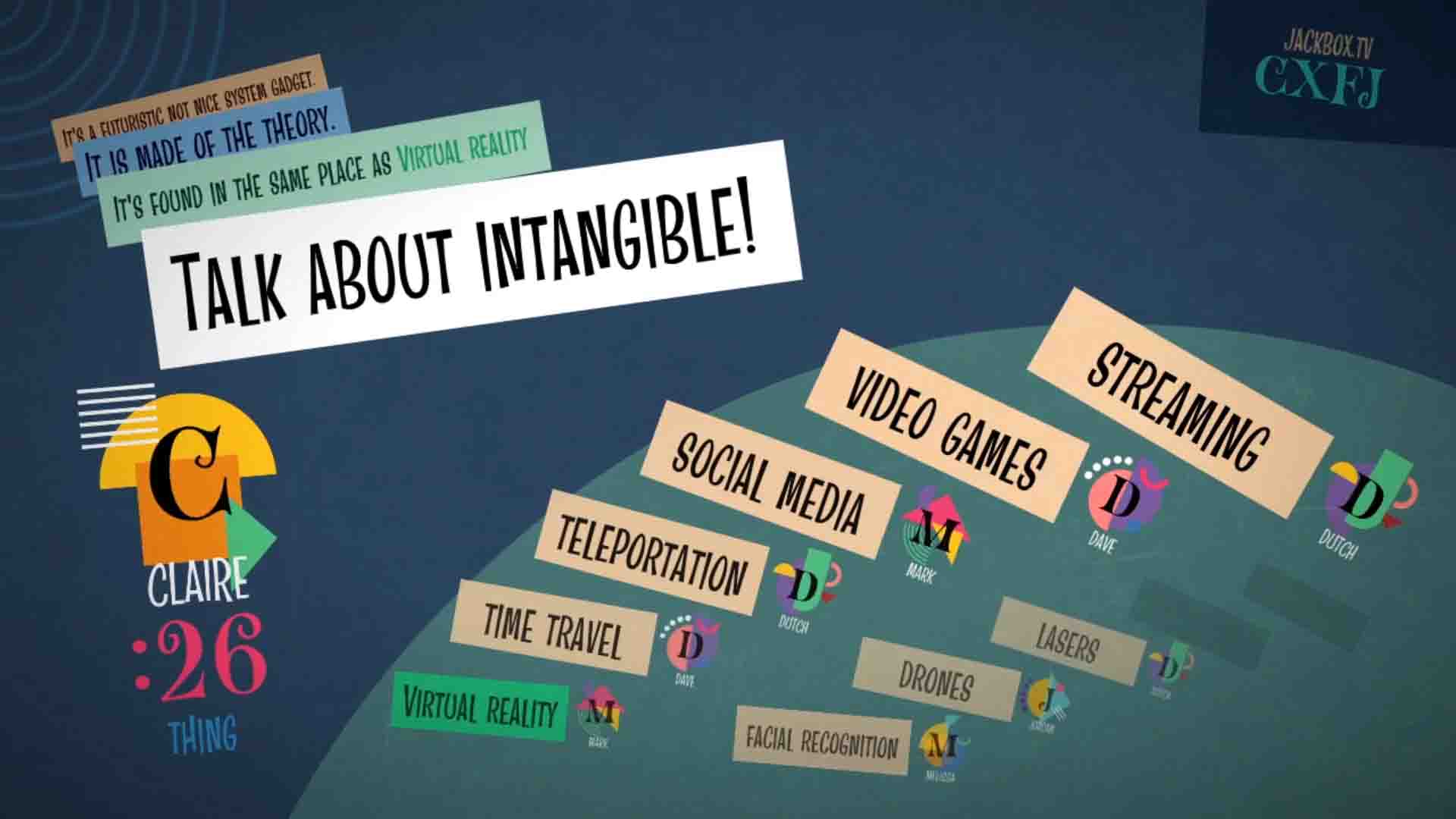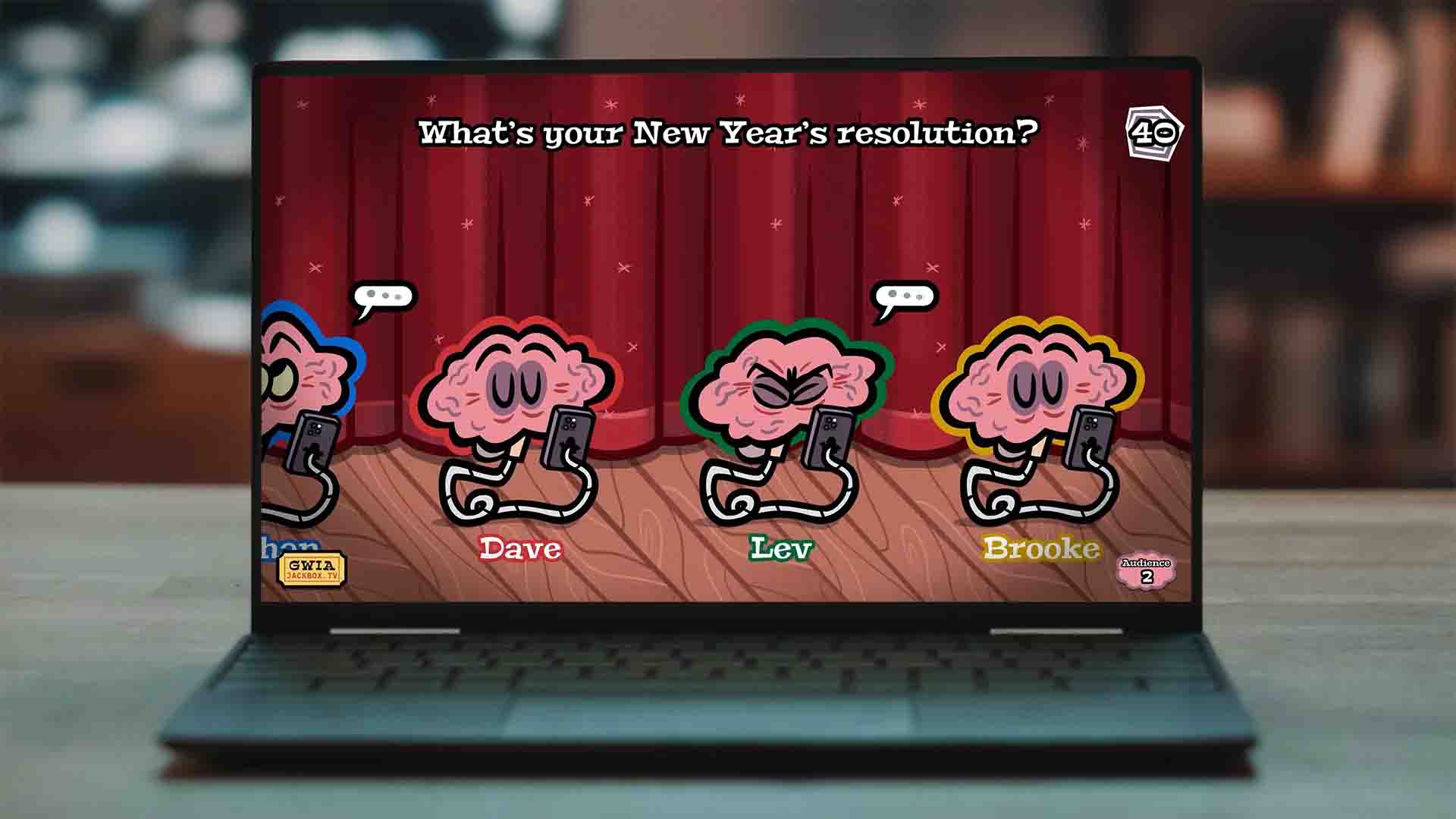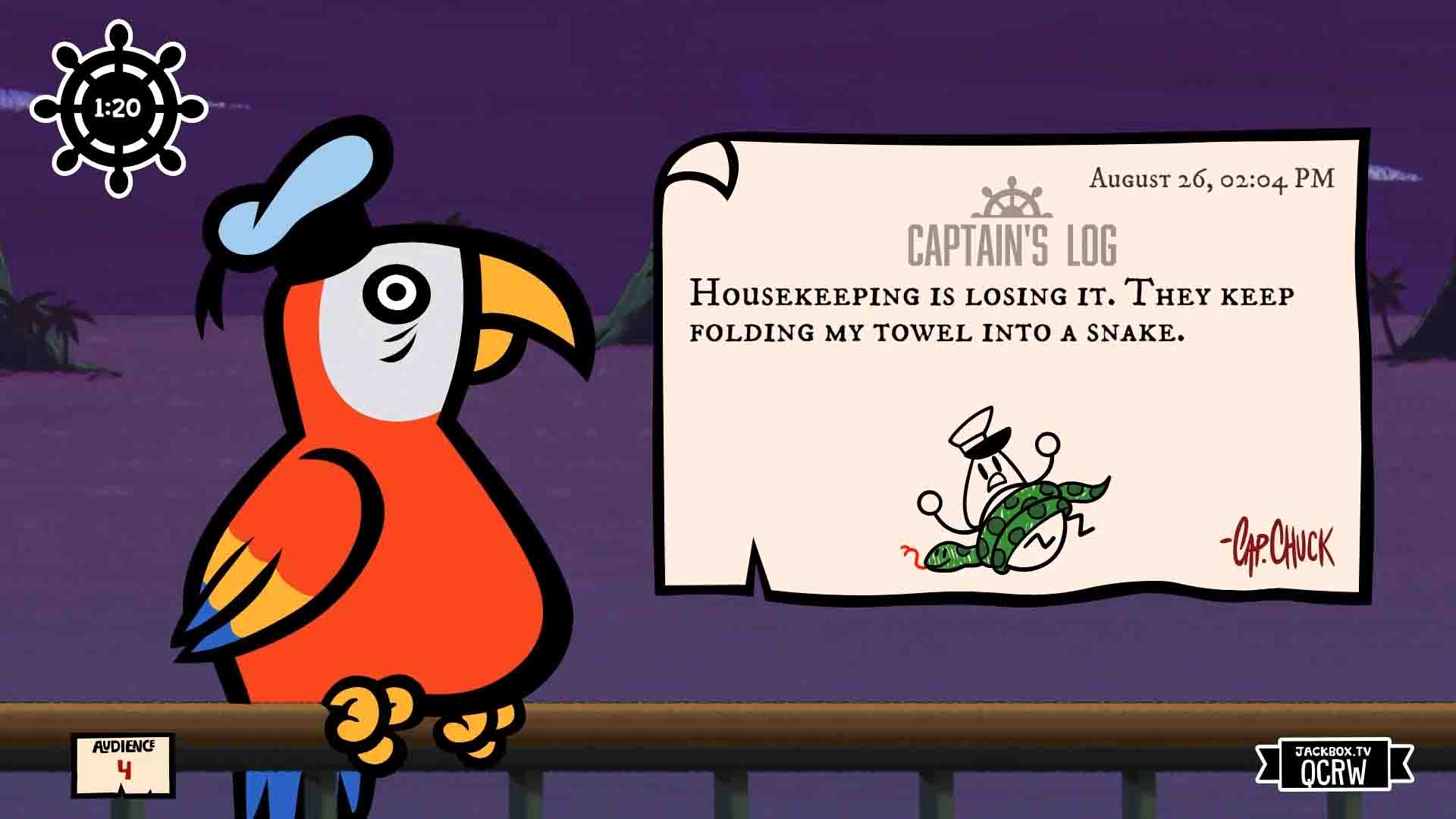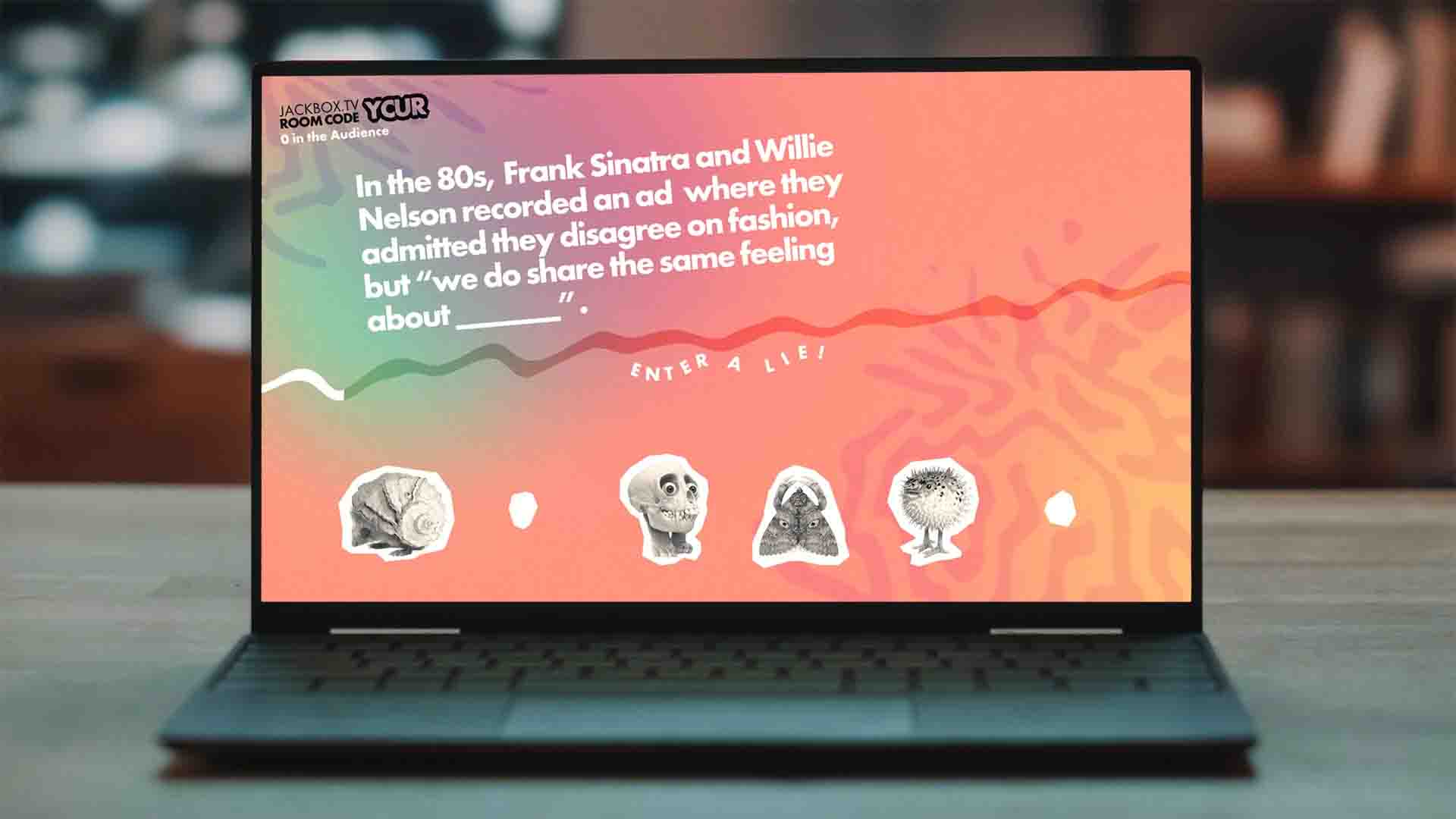The Jackbox Party Quintpack interview: “There are a ton of jokes that haven’t been found yet”
Recently, I had chance to sit down and talk to the team behind the phenomenally fun Jackbox games. Arnie Niekamp (Studio Editorial Director), Spencer Ham (Senior Creative Director), and Warren Arnold (Senior Creative Director) seem like lovely people, who come up with games that delight and amuse in equal measure. I spoke to them just after the release of the The Jackbox Party Quintpack 2.0, a collection of lots of games, but perhaps that’s a good place to start, and find out exactly what the pack entails.
Steve Chambers: So you have the Quintpack 2.0 coming out, what’s that all about then?
Arnie Niekamp: Basically, we had so many party packs that we started collecting them into larger collections of the party packs themselves instead of just a pack of five games. After we did three packs, we thought let’s package those three packs together. Now we’ve done pack ten, there’s a lot of ways to slice that up. I think, and you’ll have to forgive me if i’m not one hundred percent, I think that the quint pack is the last five packs together.
That’s a lot of games all coming together. Of the games in those last five packs, which of these stand out as favourites for you all?
Warren Arnold: Well Trivia Murder Party 2 should be in there. That’s always a highlight. TMP was already a big favourite but then TMP2 took another crack at it. It was bigger and bolder. Arnie will speak to this this that there are a ton of jokes that haven’t been found yet.
Arnie Niekamp: Yeah, there’s a lot of great Easter eggs and surprises in TMP2. It’s probably one of our more robust games that we’ve ever done. I also really love Push the Button, which is a social deduction game with drawing and writing answers, trying to find out which of your aliens is the imposter. That’s a really fun one.
Spencer Ham: I’ll just add a couple more. I’m partial to Champ’d Up from pack seven. It’s a drawing, battling game. Also Job Job, which I think is a really clever way of doing a kind of joke input game using a different mechanic. Yeah, I’d highlight those.
Is it difficult to come up with inspiration with such a varied catalog of games?
AN: It can be but in a weird way often the opposite is often true. We’ve been collectively ideating for so long that we have no shortage of half-baked ideas over the years that we didn’t quite crack on any given year or something that was fun but didn’t get greenlit, so we’re always coming up with new stuff but we’re frequently solving problems for new games with something that almost made it into a previous pack. Sometimes we also make the same mistakes again the next year. “I’m gonna try and make this work again” but it doesn’t! (laughing). There’s always a heady mix of new stuff and revisiting old stuff.
SH: Right, in some ways having a constraint as designers is actually really beneficial, knowing we have our set kind of archetypes within this party genre. It’s kind of nice to know that’s what we’re working with, so knowing that like “hey, we need to explore a trivia game”, it’s actually kinda freeing to have a constraint.

With this retrospective pack just coming out, looking forward, where’s the future of Jackbox heading next? What’s in the works at the moment?
AN: Y’know, every year it’s a little unclear. There’s only so much that we can say, besides letting people know that you can always expect a plethora of stuff from us every year. I think there will be some big surprises this year but also I think people will see things that they really familiarly recognize from Jackbox games, things that they love, with a few extra twists on them that they wouldn’t see coming. All of us have worked for Jackbox for, gosh, almost over a decade.
SH: Yeah, going on fifteen years!
AH: Yeah, we’ve all done all of these packs for around a decade and I know for myself what I love most about Jackbox is how creative the process and how it’s, y’know, one year you might be working on a rhythm music game and another year you might be on a weird drawing game, one year it’ll be a social deduction thing and the amount of time between having a dumb idea and a playtest at the beginning of the year and then people playing it at the end of the year, is so much faster than for most game companies. That’s a really fun and creatively thrilling part, for me at least.
SH: Same here. It’s both the burden but the joy. It’s like, you traditionally had such a short production cycle that you kinda wish “ I want to have a few more months” but it’s great because you know pencils go down and then there’s a new project. That variety just keeps the inspiration, the motivation to work as opposed to, like if we were like other studios spending six years in the development cycle, being an environmental artist just illustrating cacti. That, I imagine gets pretty stale and grindy. We don’t have that kind of grindy feel in the studio because of all that variety year to year.
What other games are out there are inspiring you at the moment?
SH: Balatro is just like, can we say, it’s game of the year? Because it is. It’s incredible. So yeah, playing a lot of Balatro, for sure. I was playing some Slay the Spire before that and then I realised oh, I like Balatro even more! Another thing that really inspired me recently in the last year was Dredge. I know I really loved Dredge and I’m obviously not in the minority. When you talk about mood, they just perfected that feel. I was all in. I loved that game,
AN: Balatro, I’ve been playing a ton of. Before that, it’s another maybe another obvious one but, y’know, I haven’t laughed harder than I have playing Lethal Company this year. That’s a lot of fun. As someone who likes party games, I like games where you can be rewarded for being really bad at them, right? So Lethal Company, it’s really fun to mess up and die. Frankly it gets to get less fun when you are dying less. That’s what I loved about playing games like that where both the good players and the bad players can both be having a good time together.

With your own niche brand of trivia and fun, when you’re playing these other titles, it must be tough to sometimes find inspiration from other studios work. Maybe more so an art style or soundtrack that takes you?
SH: I’m definitely an aesthetics guy. I cling to other games for inspiration, mechanics too. Another game that I loved this past year was Case of the Golden Idol. I’ve played a fair share of detective games but that was so rewarding with the mechanics of pulling words into sentences. I adored that. That, matched with the aesthetic was extremely charming. What a great style to have and what a great twist on a mechanic. That’s what I gravitate towards.
AN: I think one of the things that’s great is we work in essentially party games which in some ways are closer to tabletop games, so sometimes we find ourselves drawing more inspiration from those or old improv games or even old 70s tv gameshows, and things like that but also from video games too. Anything that you are really loving, it’s a good exercise to sit down and sort of deconstruct what you like about it because you don’t want to just take whatever is just working on the surface. It’s more like what is the feeling I’m getting from this game that I’m loving and is there some piece of that I can port into one of our games? It’s often more a thing like that. If we try and be too inspired by other games, it would fall apart. It just wouldn’t work in a party game. You have to change it so much in a party game setting, that can lead to some fun discovery.
You have so much going on in the packs with such an eclectic range within them, each one feels like a brand new experience each and every time…
AN: My favourite thing about the party pack setup is when you do five games, you can put some real weird ones in there, right? It’s the game that isn’t for everybody but the people who do like it really love it. Sometimes, we’re delighted to be surprised that the really weird one turns out to be the one that’s everyone’s favourite. That’s one of the great things about a pack. With the Quinpack you get five years of some of our most popular games but also some of the weird ones that you may be surprised by how fun they are. We consciously construct it to make sure there’s an anchor game, probably a sequel, make sure there’s a drawing game in there and then we frequently refer to the fourth or fifth game in there as that one weird one. We actually say that a lot of the time. It’s like “oh, this pack doesn’t have a weird one yet!” or “This is the weird one!”.
WA: We should make a weird pack, just get all the oddballs in there. It’s either gonna go gangbusters or just be crickets.
SH: It’s like that SNL slot, like the last ten or fifteen minutes of Saturday Night Live where they put that odd bit like “this could be the best sketch of the night or maybe the worst sketch” but taking that risk but that’s what’s great about it. We’re taking a risk. We consciously say it’s not gonna be a game that will appeal to everyone but we’re really hoping that the group that it does appeal to really likes it.It’s nice to have that in the mix.

That system seems to be working well for you. Is there a particular member of the team that you go to for their strange ideas?
SH: Arnie’s ideas can be, well, I mean there’s an on-going idea. Is it ok to mention? I’ll say “PC”, Arnie? Poop Cake? (laughing).
AN: Oh yeah. Poop Cake? Yes.
SH: So Arnie had an idea for a game called Poop Cake and I think it kinda writes itself. Hope I don’t need to explain how the game works. Arnie definitely has his fair share of “this is an idea that’s really out there”.
AN: I will say that the three of us here are probably amongst the most prolific game pitchers in the company. I think that we all have our own sort of thing. I definitely pitch a lot of the weirder ones, some of which make it in but a lot of which don’t.
SH: Now that I think about it, I did have an idea that I think it’s safe to say because I don’t think that we’re ever gonna do anything with it. I dunno, should I say it? It’s a morning DJ that can only communicate through sound bites and he’s going through therapy and he’s trying to convey his feelings through his soundboard, right? I will credit myself to that out-there idea.
WA: Oh I forgot about that.

Have there been any ideas that you have seen through to the final moments of production and then have had to discard for whatever reason?
WA: I would say the entire production of Push the Button. That went three years. We thought we had it figured out and then be like “No, wait”. That’s where we broke the game and then we went multiple different ways with it and finally it kind of clicked and became the iteration it is now. We kept running into moments that broke the game. We’d think this is the moment and then no, back to square one.
That must be so disheartening.
AN: Our best games have a moment halfway or two thirds of the way through production, where we suddenly realise “oh wait, this is how people want to play this game”. We really pay attention to people in the office when we’re playing. We naturally try to break the game on purpose or just do a weird, dumb thing with it. If we have the time, we try to embrace what people want to do with this game, the way the players try to make the game their own. That should be what the game is. We try as much as possible, even though we have a fast turnaround time, to bake in that time for discovery and to add that extra something special into the games.
Thanks to Arnie, Spencer, and Warren for their time.





